Revision ModuleB 1课件外研版英语七年级上(共17张PPT)
文档属性
| 名称 | Revision ModuleB 1课件外研版英语七年级上(共17张PPT) |
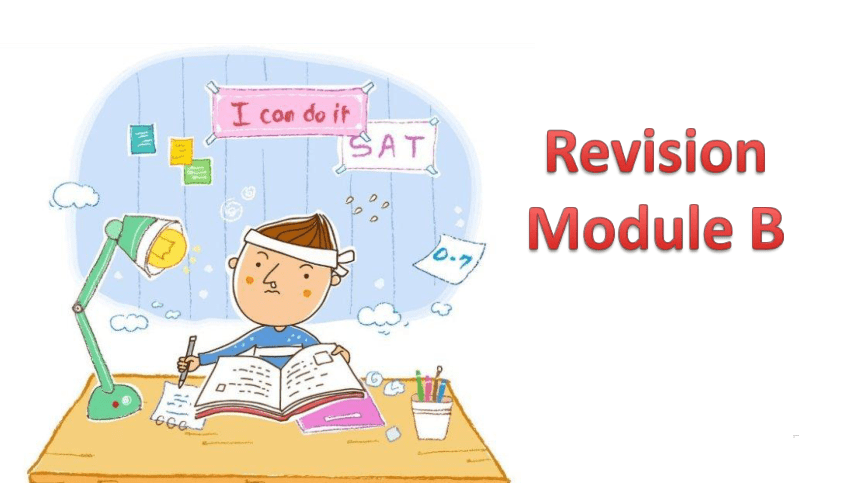
|
|
| 格式 | pptx | ||
| 文件大小 | 626.2KB | ||
| 资源类型 | 教案 | ||
| 版本资源 | 外研版 | ||
| 科目 | 英语 | ||
| 更新时间 | 2023-08-11 10:00:25 | ||
图片预览

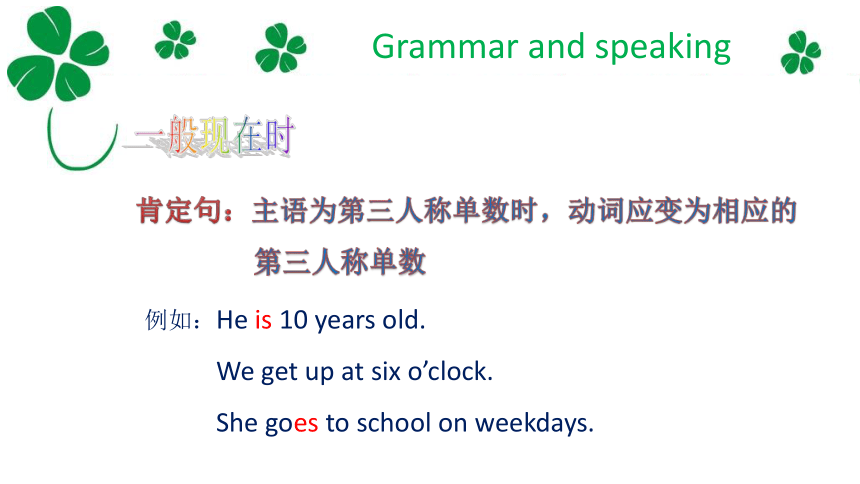
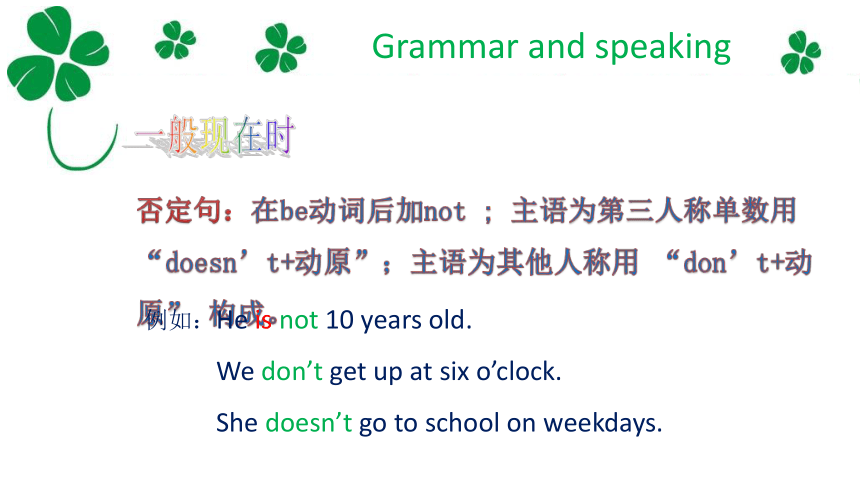
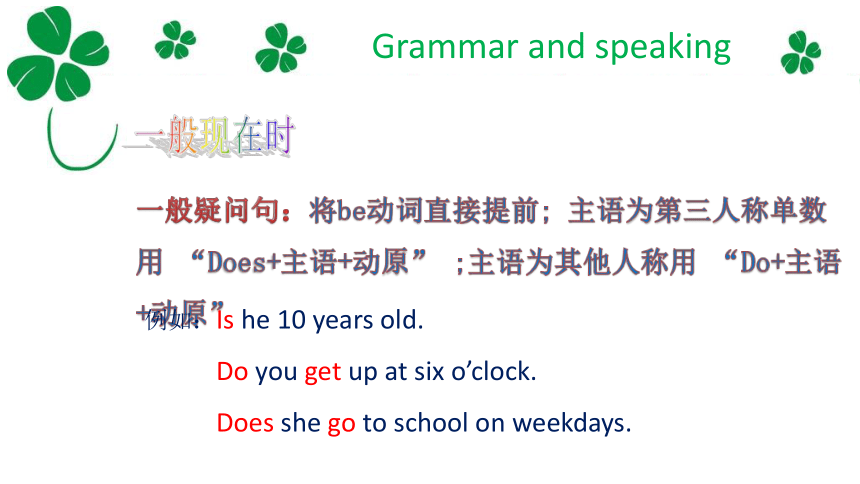
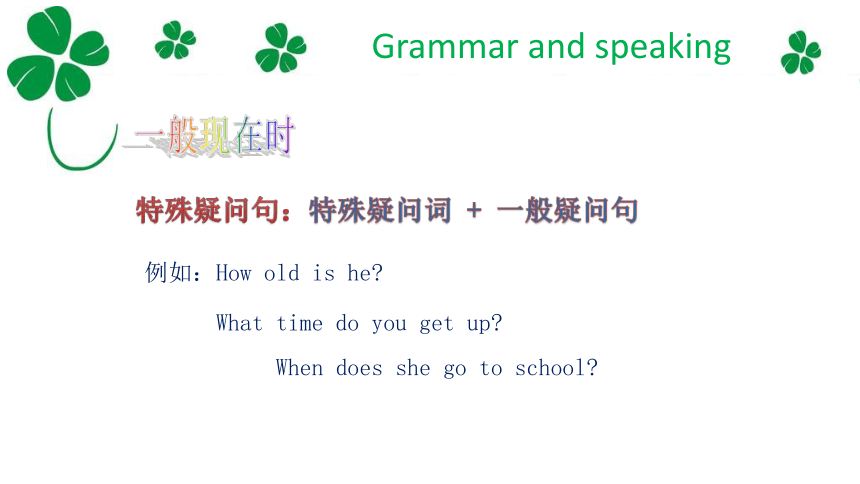
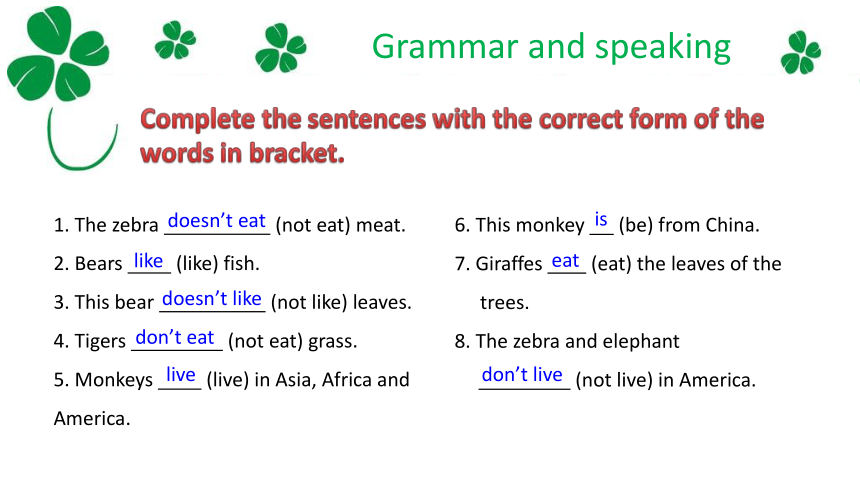

文档简介
(共17张PPT)
Rachel_jiangqi
Revision
Module B
Grammar and speaking
一般现在时
肯定句:主语为第三人称单数时,动词应变为相应的第三人称单数
例如:He is 10 years old.
We get up at six o’clock.
She goes to school on weekdays.
Grammar and speaking
一般现在时
否定句:在be动词后加not ; 主语为第三人称单数用“doesn’t+动原”;主语为其他人称用 “don’t+动原” 构成。
例如:He is not 10 years old.
We don’t get up at six o’clock.
She doesn’t go to school on weekdays.
Grammar and speaking
一般现在时
一般疑问句:将be动词直接提前; 主语为第三人称单数用 “Does+主语+动原” ;主语为其他人称用 “Do+主语+动原”
例如:Is he 10 years old.
Do you get up at six o’clock.
Does she go to school on weekdays.
Grammar and speaking
一般现在时
特殊疑问句:特殊疑问词 + 一般疑问句
例如:How old is he
What time do you get up
When does she go to school
Grammar and speaking
Complete the sentences with the correct form of the words in bracket.
1. The zebra (not eat) meat.
2. Bears (like) fish.
3. This bear (not like) leaves.
4. Tigers (not eat) grass.
5. Monkeys (live) in Asia, Africa and America.
6. This monkey (be) from China.
7. Giraffes (eat) the leaves of the trees.
8. The zebra and elephant
(not live) in America.
like
doesn’t like
don’t eat
live
doesn’t eat
is
eat
don’t live
Grammar and speaking
频率副词
频度副词通常加在行为动词前,be动词后。
例如:Betty sends me a card on my birthday.
Betty always sends me a card on my birthday.
100% 80% 60% 40% 0%
Grammar and speaking
Complete the sentences with the words in brackets.
Daming gets music from the Internet. (never)
Tony meets his friends on Saturday morning. (often)
Betty and Lingling do their homework on Sunday. (always)
Daminng never gets music from the Internet.
Tony often meets his friends on Saturday morning.
Betty and Lingling always do their homework on Sunday.
Grammar and speaking
Complete the sentences with the words in brackets.
4. Lingling visits her grandma at the weekend. (often)
5. Betty watches television in the morning. (never)
Lingling often visits her grandma at the weekend.
Betty never watches television in the morning.
Grammar and speaking
Complete the questions with the correct form of be.
1. your father cooking the meal
2. your mother cleaning the house
3. your grandma sweeping the floor
4. people in Moscow going to work now
5. people in New York having lunch now
6. your cousin going to bed now
7. you doing your homework
Is
Is
Is
Are
Is
Are
Are
Grammar and speaking
现在进行时
现在进行时表示说话时正在进行的动作
结构:be (am / is / are) + doing
例如:I am eating.
He is reading.
They are drinking.
Grammar and speaking
Look at the pictures. Ask and answer questions about them.
Are they dancing
No, they aren’t.
What are they doing
They are drinking.
Grammar and speaking
一般现在时 (动词原形 / 第三人称单数) 现在进行时
(be + doing)
动词原形 第三人称单数 现在分词(v+ing)
write writes writing
shop shops shopping
have has having
lie lies lying
一般现在时常和 often / usually / sometimes / never / always / every day连用,表示经常性行为;
现在进行时常与 now 连用,表示动作正在进行
Grammar and speaking
Complete the passage with the correct form of the words in brackets.
It’s Tony’s birthday. He usually
____ (have) a party and he
________ (have) a party now. His mother always ______ (make) a birthday cake. It __ (be) a chocolate cake --- his favourite. All Tony’s friends ____ (be) at the party.
has
makes
is
are
is having
They ____ (give) him presents and he
______ (open) them. They usually
____ (give) him CDs or books. They usually
____ (eat) healthy food but they
________ (not eat) healthy food at the party! They eat candy and _____ (drink) cola. Tony __________ (enjoy) his birthday party.
give
drink
give
opens
eat
don’t eat
is enjoying
Grammar and speaking
英语中常见的介词及词组 in in the park / in 2015 / in spring
on on the desk / on July 1st / on Monday
at at a hotel / at 6:00 / at home
about a book about the Great Wall
of a photo of Jim’s family
to go to school / five to seven / listen to
with play with him / tea with sugar
from come from / from 6:00 to 9:00
past ten past ten
behind behind the door
Grammar and speaking
英语中常见的介词及词组 near near the sea
in front of in front of Wang Hui
next to next to the hospital
on the right of on the right of the library
over over the river
like look like
before before 7:30
after after school/after that
as such as/the same as
for buy sth. for sb.
Grammar and speaking
Complete the conversation with at, in, on or to.
A: Would you like to come to my house Sunday
B: Yes What time
A: Can you make it eight o’clock
B: Good. Who is coming too
A: Zhang Hua and Li Ming.
B: Let’s listen music the morning and play basketball the afternoon.
A: OK. Would you like to go to the cinema the evening
B: Great!
in
at
to
on
in
in
Rachel_jiangqi
Revision
Module B
Grammar and speaking
一般现在时
肯定句:主语为第三人称单数时,动词应变为相应的第三人称单数
例如:He is 10 years old.
We get up at six o’clock.
She goes to school on weekdays.
Grammar and speaking
一般现在时
否定句:在be动词后加not ; 主语为第三人称单数用“doesn’t+动原”;主语为其他人称用 “don’t+动原” 构成。
例如:He is not 10 years old.
We don’t get up at six o’clock.
She doesn’t go to school on weekdays.
Grammar and speaking
一般现在时
一般疑问句:将be动词直接提前; 主语为第三人称单数用 “Does+主语+动原” ;主语为其他人称用 “Do+主语+动原”
例如:Is he 10 years old.
Do you get up at six o’clock.
Does she go to school on weekdays.
Grammar and speaking
一般现在时
特殊疑问句:特殊疑问词 + 一般疑问句
例如:How old is he
What time do you get up
When does she go to school
Grammar and speaking
Complete the sentences with the correct form of the words in bracket.
1. The zebra (not eat) meat.
2. Bears (like) fish.
3. This bear (not like) leaves.
4. Tigers (not eat) grass.
5. Monkeys (live) in Asia, Africa and America.
6. This monkey (be) from China.
7. Giraffes (eat) the leaves of the trees.
8. The zebra and elephant
(not live) in America.
like
doesn’t like
don’t eat
live
doesn’t eat
is
eat
don’t live
Grammar and speaking
频率副词
频度副词通常加在行为动词前,be动词后。
例如:Betty sends me a card on my birthday.
Betty always sends me a card on my birthday.
100% 80% 60% 40% 0%
Grammar and speaking
Complete the sentences with the words in brackets.
Daming gets music from the Internet. (never)
Tony meets his friends on Saturday morning. (often)
Betty and Lingling do their homework on Sunday. (always)
Daminng never gets music from the Internet.
Tony often meets his friends on Saturday morning.
Betty and Lingling always do their homework on Sunday.
Grammar and speaking
Complete the sentences with the words in brackets.
4. Lingling visits her grandma at the weekend. (often)
5. Betty watches television in the morning. (never)
Lingling often visits her grandma at the weekend.
Betty never watches television in the morning.
Grammar and speaking
Complete the questions with the correct form of be.
1. your father cooking the meal
2. your mother cleaning the house
3. your grandma sweeping the floor
4. people in Moscow going to work now
5. people in New York having lunch now
6. your cousin going to bed now
7. you doing your homework
Is
Is
Is
Are
Is
Are
Are
Grammar and speaking
现在进行时
现在进行时表示说话时正在进行的动作
结构:be (am / is / are) + doing
例如:I am eating.
He is reading.
They are drinking.
Grammar and speaking
Look at the pictures. Ask and answer questions about them.
Are they dancing
No, they aren’t.
What are they doing
They are drinking.
Grammar and speaking
一般现在时 (动词原形 / 第三人称单数) 现在进行时
(be + doing)
动词原形 第三人称单数 现在分词(v+ing)
write writes writing
shop shops shopping
have has having
lie lies lying
一般现在时常和 often / usually / sometimes / never / always / every day连用,表示经常性行为;
现在进行时常与 now 连用,表示动作正在进行
Grammar and speaking
Complete the passage with the correct form of the words in brackets.
It’s Tony’s birthday. He usually
____ (have) a party and he
________ (have) a party now. His mother always ______ (make) a birthday cake. It __ (be) a chocolate cake --- his favourite. All Tony’s friends ____ (be) at the party.
has
makes
is
are
is having
They ____ (give) him presents and he
______ (open) them. They usually
____ (give) him CDs or books. They usually
____ (eat) healthy food but they
________ (not eat) healthy food at the party! They eat candy and _____ (drink) cola. Tony __________ (enjoy) his birthday party.
give
drink
give
opens
eat
don’t eat
is enjoying
Grammar and speaking
英语中常见的介词及词组 in in the park / in 2015 / in spring
on on the desk / on July 1st / on Monday
at at a hotel / at 6:00 / at home
about a book about the Great Wall
of a photo of Jim’s family
to go to school / five to seven / listen to
with play with him / tea with sugar
from come from / from 6:00 to 9:00
past ten past ten
behind behind the door
Grammar and speaking
英语中常见的介词及词组 near near the sea
in front of in front of Wang Hui
next to next to the hospital
on the right of on the right of the library
over over the river
like look like
before before 7:30
after after school/after that
as such as/the same as
for buy sth. for sb.
Grammar and speaking
Complete the conversation with at, in, on or to.
A: Would you like to come to my house Sunday
B: Yes What time
A: Can you make it eight o’clock
B: Good. Who is coming too
A: Zhang Hua and Li Ming.
B: Let’s listen music the morning and play basketball the afternoon.
A: OK. Would you like to go to the cinema the evening
B: Great!
in
at
to
on
in
in
同课章节目录
- Starte
- Module 1 My teacher and my friends
- Module 2 My English lesson
- Module 3 My English book
- Module 4 My everyday life
- Module 1 My classmates
- Unit 1 Nice to meet you.
- Unit 2 I'm Wang Lingling and I'm thirteen years ol
- Unit 3 Language in use.
- Module 2 My family
- Unit 1 Is this your mum?
- Unit 2 These are my parents.
- Unit 3 Language in use.
- Module 3 My school
- Unit 1 There are thirty students in my class.
- Unit 2 The library is on the left of the playgroun
- Unit 3 Language in use.
- Module 4 Healthy food
- Unit 1 We've got lots of apples.
- Unit 2 Is your food and drink healthy?
- Unit 3 Language in use.
- Module 5 My school day
- Unit 1 I love history.
- Unit 2 We start work at nine o'clock.
- Unit 3 Language in use.
- Revision module A
- Module 6 A trip to the zoo
- Unit 1 Does it eat meat?
- Unit 2 The tiger lives in Asia.
- Unit 3 Language in use.
- Module 7 Computers
- Unit 1 How do I write my homework on the computer?
- Unit 2 When do you use a computer?
- Unit 3 Language in use.
- Module 8 Choosing presents
- Unit 1 I always like birthday parties.
- Unit 2 She often goes to concerts.
- Unit 3 Language in use.
- Module 9 People and places
- Unit 1 We're enjoying the school trip a lot.
- Unit 2 They're waiting for buses or trains.
- Unit 3 Language in use.
- Module 10 Spring Festival
- Unit 1 Are you getting ready for Spring Festival?
- Unit 2 My mother's cleaning our houses and sweepin
- Unit 3 Language in use.
- Revision module B
